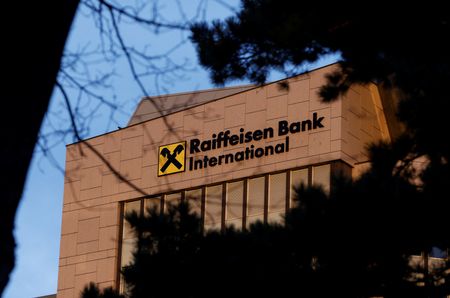By Alexandra Schwarz-Goerlich and John O’Donnell
VIENNA (Reuters) -Raiffeisen Bank International (RBI) took aim on Thursday at “morally arrogant” critics of its dealings in Russia, though said it was considering spinning off its business there anyway amid mounting pressure.
The Austrian lender is now the most important Western bank in Russia, offering a lifeline to people and businesses there seeking to make international payments, but it is under growing pressure from Western officials and investors to quit.
Chairman Erwin Hameseder accused critics of “black and white moral thinking” from a “risk free zone of comfort”, and said most Western businesses had not left Russia despite its invasion of Ukraine, a war he decried as unjustified.
“That is reality,” he told the Austrian bank’s annual general meeting (AGM).
However, CEO Johann Strobl told the meeting the bank would pursue a possible sale or spin-off of its Russian business. He said it would continue to reduce activity in Russia while it pursued those options, but would keep some business there to maintain its bank licence. He was heckled by a member of the audience. “RBI will pursue possible transactions that can lead to a sale or a spin-off of Raiffeisenbank Russia and its deconsolidation from the RBI group,” Strobl said.
In January, the U.S. sanctions authority launched an inquiry into Raiffeisen over its business related to Russia. Earlier this month, people familiar with the matter told Reuters the European Central Bank was pressing RBI to unwind its highly profitable business in Russia. The pressure comes after a top U.S. sanctions official raised concerns about RBI’s business in Russia on a visit to Vienna last month, another person said.
A senior Raiffeisen executive said the bank was in talks with two potential buyers, including one from Russia, but any spin off would take four to seven months.
At the AGM, Hameseder singled out “journalistic critics sitting in the sidelines”, saying the bank was helping diplomatic missions in making payments and pointed to U.S. lenders, including Bank of America, still active in Russia.
That echoed recent remarks by Austria’s foreign minister, Alexander Schallenberg, who defended the country’s second-biggest bank, saying it was unreasonable to single it out when so many other Western firms were still in Russia.
RBI has been sharply rebuked by investors after participating in a Russian scheme to grant loan payment holidays to troops fighting in Ukraine.
During Austrian President Alexander Van der Bellen’s visit to Kyiv last month, Ukrainian President Volodymyr Zelenskiy criticised Austrian businesses still operating in Russia, singling out RBI.
Although the stakes are high, some Austrian officials hope they can hold out long enough for a negotiated resolution to the war, allowing for a resumption of normal business with Russia, people familiar with the matter have told Reuters.
RBI made a net profit of roughly 3.8 billion euros ($4.1 billion) last year, thanks in large part to a 2-billion-euro-plus profit from its Russian business. Russian savers have lodged more than 20 billion euros with the bank.
($1 = 0.9193 euros)
(Reporting by John O’Donnell; Editing by Miranda Murray and Mark Potter)





